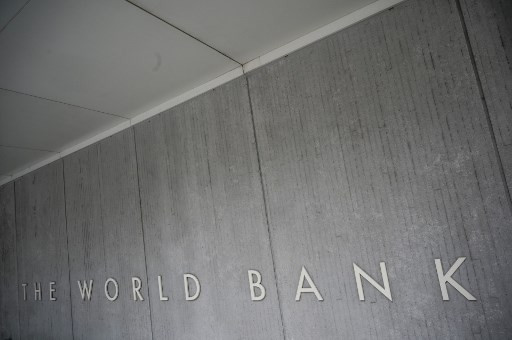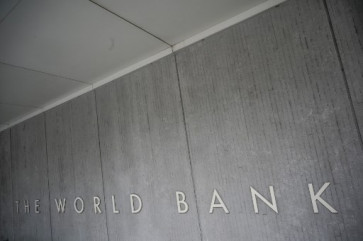World Bank’s worst-case scenario for Indonesia just got worse
A new World Bank report suggests Indonesia’s economy is more vulnerable than previously assumed with greater risk to the downside should the vaccine rollout, consumer confidence or labor market recovery take longer than expected.
Change Size
 The World Bank Group logo is seen on the building of the global development lender in Washington, DC, in January 2019. The World Bank’s June outlook for Indonesia states that “risks to the outlook are severely skewed to the downside.” (AFP/Eric Baradat)
The World Bank Group logo is seen on the building of the global development lender in Washington, DC, in January 2019. The World Bank’s June outlook for Indonesia states that “risks to the outlook are severely skewed to the downside.” (AFP/Eric Baradat)
T
he World Bank has maintained its forecast for economic growth in Indonesia but sees a greater downside risk following the emergence of more contagious COVID-19 variants.
While the national economy is forecast to expand 4.4 percent this year and 5 percent next year, the global lender sees Indonesia’s GDP rise just 2.1 percent this year and 3.1 percent next year under a worst-case scenario, down from 3.1 percent and 3.8, respectively, in its December outlook.
The World Bank’s June outlook states that “risks to the outlook are severely skewed to the downside,” given the uncertainty in the future path of the pandemic, global financial conditions, the scarring effect of the crisis and the banking and financial sector’s performance.
“The pickup in domestic demand is predicated on containment of the pandemic, recovery in confidence and the gradual strengthening of labor market conditions,” Habib Rab, the World Bank’s lead economist for Indonesia, said at the online event to present the bank’s latest outlook on Thursday, adding that stimulus spending in the United States was expected to have a positive spillover effect.
“On the other hand, a slower-than-expected vaccine rollout, renewed acceleration in COVID-19 cases, tighter external financing conditions and weaker global growth could lead to potentially worse outcomes.”
In the January–March period, Indonesia’s GDP showed further improvements with the contraction slowing down to 0.74 percent year-on-year (yoy)
The economic recovery is at risk of slowing down following the recent surge in daily new COVID-19 cases, which surpassed 9,000 on Wednesday, the highest since mid-February. Moreover, less than 5 percent of the total population is fully vaccinated, and only 7.64 percent had received a first vaccine dose as of June 15.

















